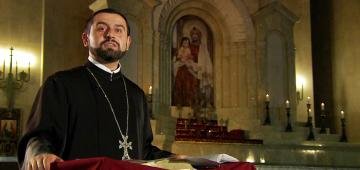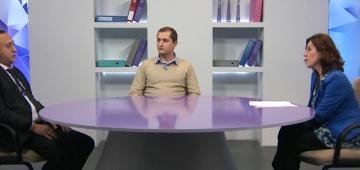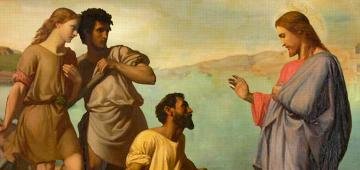 |
The first epistle to the Thessalonians (1:1-3)
Father Arnak Harutyunyan interprets the verse 1:1-3 from the first epistle of Apostle Paul to the Thessalonians.
|
 |
Children’s Right to Privacy
Psychologist Hrachya Amiryan and Aida Muradyan from World Vision Armenia, Child Protection Program Director, discuss the implications of the statutory provisions on the protection and immunity of children’s privacy; violation of children’s dignity and its impact on emotional life; public discourse of family life.
|
 |
Conflict Transformation through Negotiations
With the partnership between the Armenia Inter-Church Charitable Round Table Foundation, Armenian-Russian University of Armenia and "Foundation against the Violation of Law" NGO, the subject “Conflict Transformation through Negotiations” was introduced in the University. The subject is taught for three years now. The objective is to develop students’ negotiation and communication skills, critical thinking, objective argument perception and building. How efficient was the study of the subject, how did the the students’ understanding on transforming or solving regional conflicts change? The topic is discussed by Larisa Alaverdyan, the Director of Law and Politics Institute of the Armenian-Russian University, Lilit Haroyan –postgraduate student of the Chair of International Relations and Global Politics and graduate student Ruben Zakharyan.
|
 |
Old Sects in New Waves
The legal heritage of the 8th century Catholicos Hovhan Odznetsi is considered to be the basis of Mkhitar Gosh and Smbat Gundstabl Datastanagirk (The Lawcode). "The Code of Conduct for Armenians" regulated social, legal, civil relations, contained instructions for fighting sectarian movements. The opponency he wrote against religious movements revealed the essence of the ideological struggle of the backsliders of the time. Experts, according to this literature, identify the ideas of old sects in contemporary religious trends. Odznetsi's literature also sheds light on the events of this history-wise scarce period.
Azat Bozoyan, Head of the Oriental Studies and Historiography Department at the Institute of Oriental Studies, and Chair of the Dialogue NGO Almast Muradyan speak at the pavilion of “Option”.
|
 |
Armenia and Neighbors: In Search for Peace, part 6
Another discussion of the program "Armenia and Neighbors: In Search of Peace” of the Inter-Church Charitable Round Table Foundation of the World Council of Churches is dedicated to Armenia-Georgia-Iran-Turkey axis. What new perspectives of cooperation in the South Caucasus are there in view of rapid changes in the world, how can they serve to maintain the peace in the region? Interview with Alexander Rusetsky, Director of the South Caucasian Regional Security Institute of Georgia, Turkish journalist Serdar Corjun and Imam Ali Mohammad Shajanan of the Blue Mosque in Yerevan.
|
 |
Narekatsi between East and West
Who is Narekatsi for the world? How did he win the spiritual treasury of different nations? What makes them keep turning to Narekatsi, his heritage, what new studies come forth over the recent years? How did the heritage of Universal teacher get to be proclaimed and what is the investment of Armenian Studies Centers of the world in all these?
Experts in Armenian Studies Jean-Pierre Mahé and Abraham Teryan have a conversation.
|
 |
Conversion of Saul
“And as he journeyed, he came near Damascus: and suddenly there shined round about him a light from heaven. And he fell to the earth, and heard a voice saying unto him, Saul, Saul, why persecutest thou me? And he said, Who art thou, Lord? And the Lord said, I am Jesus whom thou persecutest: Arise, and go into the city, and it shall be told thee what thou must do.”
Who was Saul, why did he persecute Christians and how did he convert?
Father Arnak Harutyunyan expands on the life of Apostle Paul.
|
 |
Paul – the Apostle of Pagans
Why is Paul considered to be the Apostle of pagans? What did he get involved after becoming Christian? What does it mean to be an Apostle? Father Arnak Harutyunyan goes on telling about the life and activities of Apostle Paul to the Thessalonians.
|
 |
Petros Getadardz and Fall of Ani
A deadly blow was put on the Armenian statehood by the fall of the Bagratidian kingdom. In addition to external enemies attacks, there was internal divide in the country. Gagik's two sons, Hovhannes Smbat and Ashot, were fighting for the throne. The younger brother asked for military assistance from Baghdad, and the senior heir of throne bequeathed Ani to Byzantine Empire, which had to ensure its security and rest. One more fact is that Ani has been submitted to the Byzantines by Catholicos Petros Getadardz. What was the role of the Catholicos, was the participation of Getadardz analyzed objectively and comprehensively?
Dr. Karen Matevosyan, Doctor of Historical Sciences and Vahe Torosyan, Candidate of Historical Sciences talk about these issues.
|
 |
Appropriation of Taik spiritual-cultural heritage
According to the claims of Georgian scientists, Taik, the 14th state of Greater Armenia, was permanently inhabited by ethnic Georgians, while the Armenians were settlers. Based on this viewpoint of Georgian studies, the Georgian side has claims not only over the religious and secular architecture but also over spiritual and cultural achievements. Many architectural buildings of Taik that are currently in the territory of the present-day Turkey, according to the recently placed signs, are Georgian, and the Georgian side is also implementing studies and restoration works there. Davit Nahatakyan, Candidate of Architecture Science, and Arkady Akopov, Candidate of Historical Sciences, talk about Armenian studies of architecture and demographic situation of Taik.
|
|
|
From Shnorhali to Vospnaker: Nicknames and Honor Names of Clergy
The nicknames and honor-names assigned to the clergy reveal their characters, lifestyle, merits, behavior and even civil position. The topic is discussed by the Head of the Department of Manuscript Studies and Mayr Tsutsak in Matenadaran Gevorg Ter-Vardanyan and graduate of Gevorkian Seminary Deacon Manvel Sargsyan.
|
 |
Apostle Philip
The Gospel talks little about Philip. The Apostle’s name – Philippos has Greek origin, meaning fond of horses. Before meeting Christ, he most likely was one of the disciples of John the Baptist, like John and Andrew. He was also obsessed with expectation of the Messiah, and just as most of his contemporaries, did not even suspect that He, whom he was longing to see, was already there, next to him.
|